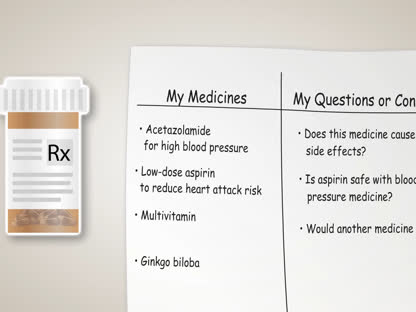Overview
Taking medicine as your doctor prescribes may improve your health and may prevent future problems. Not taking medicines properly could put your health or your life at risk.
Taking your medicines safely is especially important for those who take a lot of medicines. Taking a lot of pills increases your chances of having problems. If you take more than one medicine that works the same way, you could get too high a dose. And sometimes medicines work against each other.
Problems may be more likely if:
- You see more than one doctor and don't tell each one about the medicines you take.
- You use more than one drugstore. Unless you tell them, those pharmacists may not know all the medicines you take.
- You're an older adult. As you age, your body slows down. Some medicines stay in your body longer.
- One medicine gives you side effects, so you take another one to feel better.
- You take herbs or vitamins without talking to your doctor or pharmacist first.
Talk to your doctor or pharmacist for help taking your medicine. Try to take each of your medicines at the same time each day. Keep a list of your medicines. To keep track of all your pills, try using a weekly medicine organizer.
How to Take Your Medicines
Taking your medicines as your doctor says may include:
- What time of day you take them.
- How much you take.
- How you take them, such as with water or food.
- How long you need to take them.
Try to take each of your medicines at the same time each day. Make a list of your medicines, and post it someplace where you will see it often. The list should include the name of each medicine, the dose, how often you take it and when, and any special instructions (such as whether you take it with meals or on an empty stomach).
To keep track of all your pills, try using a weekly medicine organizer.
Learn more
Watch
Overcoming Barriers to Taking Your Medicines
People have trouble taking medicines properly for many reasons. If you're having problems taking your medicines as prescribed, it may help to think about why you're having trouble. What barrier is getting in your way?
When you know why you're having trouble, you can find ways to deal with the problems. This may make it easier to take your medicines as your doctor wants you to.
Here are some common barriers to taking medicines, along with some ideas for dealing with them.
Barriers and solutions
Barrier |
Solution |
"Medicines cause side effects that bother me." "The medicine makes me feel worse." "I think the medicine is making my health problem worse." |
- If side effects bother you, talk to your doctor or pharmacist. Your doctor may be able to prescribe another medicine or suggest ways to reduce the side effects. For example, if an upset stomach is a problem, ask if taking the medicine with food will help.
- Ask your doctor or pharmacist about medicine interactions. One medicine you are taking may change what another medicine does. This can cause worse side effects or make a problem worse.
- Ask your doctor if there are medicines you should not take. This includes supplements and herbal products.
|
"The medicine costs too much." "I don't have insurance." |
- Talk to your doctor or pharmacist. Is there a lower-cost medicine you can take? Can you use a generic medicine? Does your health plan offer lower-priced options? The doctor or pharmacist may have other ideas that could save you money, such as buying in bulk or splitting pills.
- Shop around. The cost of a medicine can vary from one drugstore to another. You can also look into mail order and using the Internet.
- Call social services or religious groups for possible help. Or get in touch with Medicaid, a government program that may be able to help you with medicine and treatment.
- Some drug companies offer help. Search the Internet for the drug or company name and "patient assistance program." If you're not sure about your medicine's name or who makes it, ask your doctor or pharmacist.
- Make sure you are taking medicines that are covered by your health plan, if possible.
- Make lifestyle changes to improve your health. Eating lots of fruits and vegetables and less fat and getting more exercise may help your health problem. This could mean that you need less medicine. Less medicine means lower costs.
- Don't use less of your medicine, such as taking half a dose or using it every other day. It's very important to take the medicine as your doctor tells you.
|
"It's hard to keep track of so many medicines." "I forget when and how to take all of these medicines." "Sometimes I just forget to take my medicines." "My schedule keeps changing, so it's hard to remember to take my medicine." |
- Ask your doctor which medicines you are taking and why you are taking them, and then make a master list. If you understand what you are taking and how it helps you, it may be easier to stay on schedule. Keep your master list up-to-date. At every visit with your doctor, review your master list of medicines.
- Plan a daily schedule of medicines. Be sure you understand how much of each medicine to take and when to take each one. Put your schedule somewhere where you will always see it and where it's easy to find. Take it along when you travel. Write down your daily medicine schedule in a form that has spaces for time entries.
- Use a pillbox. Get a pillbox that holds a week's worth of pills. This may be especially helpful if you are taking pills every other day.
- Remind yourself. Post notes near clocks or on the bathroom mirror to remind you to take your medicines. Use a wristwatch with an alarm, and set it for times when you need to take your medicine. Or take the medicine when you do a daily task, such as brushing your teeth or making your coffee.
- Ask your doctor whether you can take a longer-acting medicine instead of a shorter-acting one. This means you'll be able to take fewer pills. This may make it easier for you to remember to take your medicines.
- If you use several inhaler medicines, put a label on each one so that you know which one to use at the right time.
- Talk with your doctor about what you should do if you miss a dose of a medicine. Discuss what to do for each medicine—it may be different for each one.
|
"I keep getting interrupted before I can take my medicine." |
- Ask the person interrupting you to wait while you take your medicine.
- Keep your medicine in your hand. You will be more likely to take it later.
- Place a reminder somewhere where you will see it, such as in your car or with your house key.
|
"I run out of my medicine." |
- Talk with your doctor or pharmacist about how long your medicine will last. Then mark on a calendar when you need to get a refill of your medicine.
- Ask your doctor to prescribe a large supply of medicine with many refills. For example, if you're taking a medicine long-term, ask for a 3-month supply with a year's worth of refills.
- Ask your pharmacist if there are ways the pharmacy can remind you to refill your medicines so you don't run out.
|
"I feel good, so I don't take my medicine." "I don't think my medicine is working." |
- Remember that you feel good because you're taking the medicine.
- Remember that some health conditions, such as high cholesterol and high blood pressure, don't make you feel sick. But medicine can lower your risk for serious problems, such as a heart attack and stroke.
- Remember that some medicines do not help right away—they take time.
- Remember that your medicines can help you prevent complications that could happen because of your health problem.
- Talk to your doctor about your concerns.
|
"I need to use an inhaler, but it's too hard to use." "I have to give myself a shot, and it's hard for me." "It's hard for me to swallow pills." |
- Ask your doctor or pharmacist to show you how to use your inhaler. Using a device called a spacer may make it easier.
- Ask your doctor about medicines that don't require an inhaler.
- Ask your doctor, pharmacist, or diabetes educator for advice or tips on giving yourself shots.
- Take a few sips of water to moisten your throat before you swallow the medicine. And then drink a full glass of water to swallow the medicine.
|
Learn more
Watch
Credits
Current as of: October 25, 2024
Current as of: October 25, 2024




